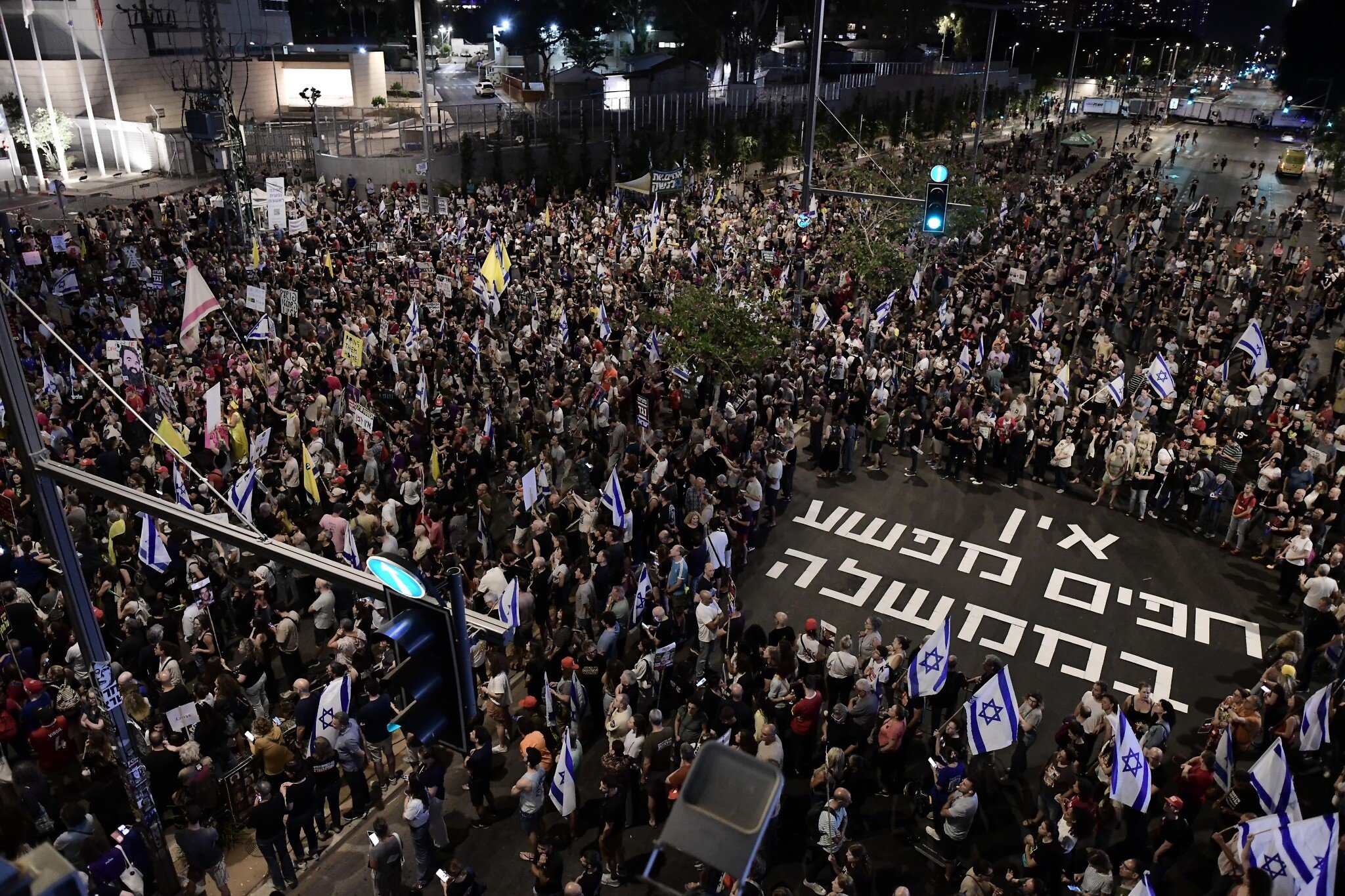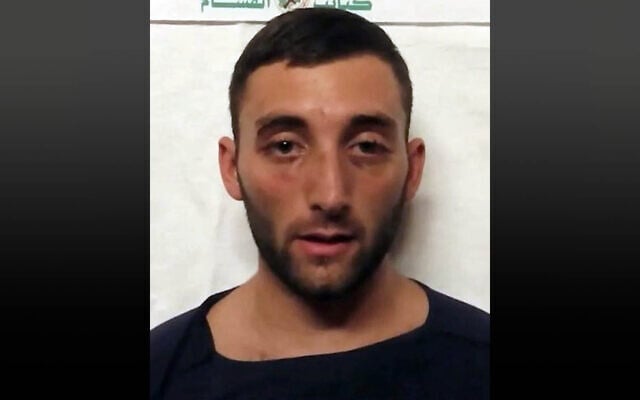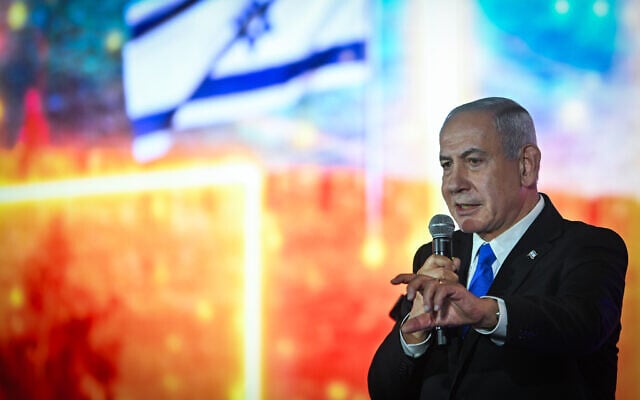



Relatives of hostages on Tuesday accused Prime Minister Benjamin Netanyahu of toying with them the previous day when he promised a big announcement on the captives “today or tomorrow,” walked back the comment, and then repeated it.
“When the prime minister himself talks about it, we understand that maybe something real is happening,” Herut Nimrodi, mother of captive soldier Tamir Nimrodi, told Army Radio.
“It sent all the families into a frenzy. I didn’t know how to swallow it later when I heard it had been an aside,” said Nimrodi, whose son is one of three hostages for whom no sign of life has been received since their abduction.
Anat Angrest, mother of captive soldier Matan Angrest, told Kan public radio that she had understood “from Netanyahu’s tone… that he was not talking about tomorrow, but rather the future.”
Angrest added that soldiers fighting for Israel should know that if they fall captive, “not a single minister or Knesset member will fight for them, even if they are tortured, even if they are violently interrogated, none of them will care.” She told Army Radio a government minister had told her husband on Monday that “this is the price of war.”
Speaking to Channel 12, Eli Albag, father of formerly captive soldier Liri Albag, said without elaborating that a member of one hostage family member had “tried to do something to himself” after the rug was pulled out from under him.
“The families started to get happy, they were as happy as one can get, but quickly they realized it was just blather, with no significance,” putting them in an extreme emotional state, said Albag.
He accused Netanyahu of irresponsibility, adding that the premier is “not just some tweeter” and his words carry weight. “Every word kills,” said Albag.
“The families don’t have strength anymore. Six hundred days is too much,” he added. On Wednesday, Israel will mark 600 days since October 7, 2023, when thousands of Hamas-led terrorists stormed southern Israel to kill some 1,200 people and take 251 hostages, sparking the war in Gaza.
Netanyahu had said Monday at the tail end of a video statement: “I really hope we can announce something regarding the hostages, if not today, then tomorrow.”
After anxious queries from families, his office cited a “senior official” as saying the comment should not be seen as a hint toward an impending ceasefire-hostage deal in Gaza, and accused Hamas of stonewalling in negotiations.
“The prime minister meant that we will not give up on freeing our hostages, and if we don’t achieve that, hopefully in the coming days, we will achieve it later on,” the statement said.
Netanyahu went on to make a similar comment during a speech Monday evening at the state Jerusalem Day ceremony, at the capital’s Ammunition Hill: “The task in Gaza, including the task of returning our hostages, keeps us busy every day and every night… We aren’t letting go of this, and if we don’t fulfill it today, we’ll do it tomorrow. And if not tomorrow, the day after.”
“It is psychological terror in every sense of the word when a prime minister throws out an aside about my brother’s life,” Yotam Cohen, brother of captive soldier Nimrod Cohen, told Ynet. “This is despicable, and was done in the most crude, disgusting way.”
Vicky Cohen, Nimrod and Yotam’s mother, said on Reshet Bet that she hadn’t slept because the premier’s words were “echoing in my head all night.”
“Why is the Israeli government insisting on a partial deal while Hamas is demanding a comprehensive deal?” she asked, expressing fear that a partial ceasefire-hostage deal would leave her son behind. “What’s the plan to bring back Nimrod?”
Foreign media had on Monday cited unnamed Hamas officials declaring that the group had accepted a deal proposed by Steve Witkoff, the White House’s special envoy to the Middle East. Witkoff denied that Hamas had accepted his proposal, and called on the terror group to agree to a temporary offer that he said Israel would accept. At the Jerusalem Day ceremony, Netanyahu called Hamas “stubborn” and said Witkoff agreed with him.
The deal being discussed would see around 10 living hostages and 10 bodies of hostages, along with hundreds of Palestinian security prisoners, released in two stages during a roughly two-month ceasefire. During that time, Israel and Hamas would hold negotiations on the terms of a permanent truce.
Israel and Hamas had reached an agreement in January, the first phase of which saw Hamas release 33 women, children, civilian men over 50 and those deemed “humanitarian cases,” in exchange for some 2,000 Palestinian prisoners.
The first phase expired March 2 amid Israel’s refusal to negotiate the second phase, which would have required a full Israeli withdrawal from Gaza — a red line for Netanyahu and his far-right allies. On March 18, Israel resumed hostilities in Gaza, and has recently launched an operation aimed at seizing 75% of the Strip.
Terror groups in the Gaza Strip are still holding 58 hostages, including the body of a soldier killed fighting in the 2014 war. At least 35 hostages have been confirmed dead, another 20 are believed to be alive, and there are grave concerns for the well-being of the three others, Israeli officials have said.
Jacob Magid contributed to this report.



